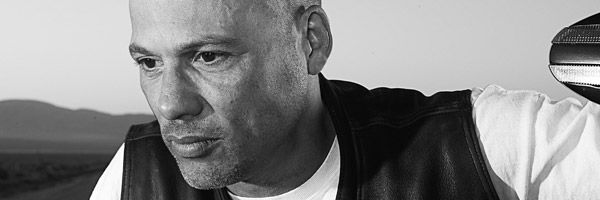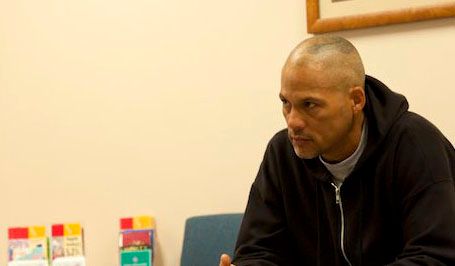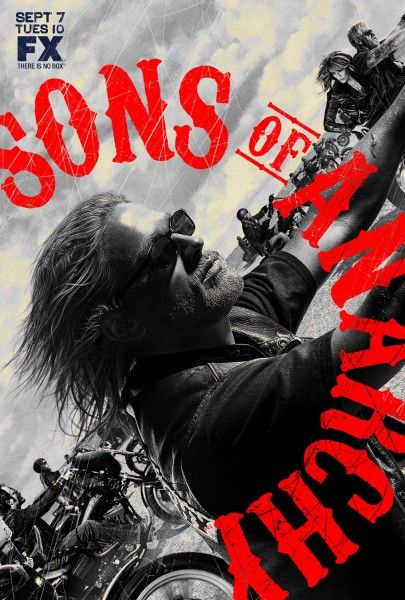On the FX drama series Sons of Anarchy, David Labrava stars as the ultra-intense, fully-patched SAMCRO member, Happy, the club’s assassin. In addition to his debut acting role on the show, Labrava also co-wrote Episode 10, called “Hands,” for this season, along with Chris Collins and show creator Kurt Sutter.
During a recent interview to promote Season 4 and his work on the series, David Labrava talked about how he went from technical advisor to cast member, the difference in the process for writing for television as opposed to film, that he got his first Harley Davidson when he was 17 years old, how he gets recognized by fans at least once a day, and that show creator Kurt Sutter is his writing mentor. Check out what he had to say after the jump:
Question: Did you have any formal acting training? How did this role come about for you?
DAVID LABRAVA: I got hired to be the technical advisor, and when (show creator) Kurt [Sutter] came up to my area to get some technical advice on the motorcycle club world, I showed him that I wrote scripts and I asked him to let me have a chance, when he cast the show. I got cast on the show, and then he gave me a real chance to write, and here I am.
Had you wanted to try your hand at acting before this, or was this just an opportunity that came about?
LABRAVA: It seems like the Hollywood thing found me a couple of times. I wasn’t living here, trying to do this, at all. I’m a tattoo artist and I went to school to paint, and I started writing and getting published. I think every American kid grows up dreaming about being in the movies. That’s completely normal for us. But, I mostly wanted to be a writer, and I got taught the scriptwriting program. I got a chance to act, and I have to say that acting is extremely fun and vital. It’s an incredible crew that I work with. They all have a great appreciation for film. We do movie trivia all day long. Ron Perlman knows film, all the way to black and white. I enjoy the acting, but I didn’t plan on that. It fell into my lap and I’m having a lot of fun with it, but I’m definitely moving towards directing because I’m naturally a writer, and I think a good director edits, writes and has acted a little bit. He’s done a little bit of everything, and that’s what I’m trying to do.
What do you prefer to do more, write, act or direct?
LABRAVA: I love writing. I think writing and directing go hand-in-hand. I’ve been writing and getting published since 1990. I kind of fell into the acting, which is a lot of fun. I enjoy acting, but I’m definitely pushing towards directing.
Would you star in any of the other things that you write or direct?
LABRAVA: I sold my own show last year, which now we’re shopping around to cable. FX is very good to me, to allow me to do that. I also finished a feature film with a sequel we are shopping around now. I might put myself in a cameo in any of that, but mostly I want to be behind the camera.
Episode 10 was really intense. How did the fight between Clay (Ron Perlman) and Gemma (Katey Sagal) come about?
LABRAVA: I think it’s been culminating for quite some time. In my personal opinion, if we just stay on the show level, I think Clay should keep Gemma a little bit closer, since she is complicit, from the start. If you follow the show, they [supposedly] killed JT together, and now Clay is pushing her to the outside, but Gemma is no dummy. She’s been around the block, so I thought that that fight scene was right on time. It’s right where it should have been.
Did you think it was a risk to show that much violence?
LABRAVA: Not at all. Violence sells. If you follow the Internet, I think the entire viewing public really wants Clay dead, which makes for great television. That’s the A-story. It’s Clay and Jax (Charlie Hunnam), and Clay and Gemma, and how evil Clay can really be, which seems to have no boundaries. I really enjoyed the end, too. You’ve got all these people with history – Gemma and Unser (Dayton Callie) grew up together, and they have history with Clay. It’s primetime for everybody. Gemma wants Clay dead by the hand of a son – her son – so it’s going to be interesting, as it comes to an end.
What was the creative process that you followed to complete the script for Episode 10? Were you given a basic storyline structure to follow? How much lee-way did you have to incorporate your own ideas?
LABRAVA: Writing a TV show is totally different than writing features. I started with writing features. You write a little bit more organically. You start from the beginning, and then move to the middle, and then the end. In the TV world, there are probably at least 25 points that have to get carried over, from episode to episode, to make the show work. It’s an incredibly creative process to sit in that writers’ room with six other people and pitch ideas until you have a great story. And then, Kurt [Sutter] comes in. He is an incredible writer, and you pitch ideas until everybody gives feedback and everybody signs off on it. Then, you move away to write the dialog and fill in the blanks on the show.
Viewers haven’t seen much of Happy, on an individual level. What are Happy’s thoughts, regarding the present situation that the club is facing, and what can we expect from him, as the season comes to a close?
LABRAVA: I think Happy is getting a little bit more vocal, but like in the club, there are all kinds of members – every kind you can imagine. Some guys are basically just soldiers, which is Happy. He’s a solider. He’s not an officer, and he doesn’t desire to be an officer. He’s there to just make things happen for the club. On a production level, as an actor, I couldn’t be in Episode 10, and sit in the writer’s chair behind Peter Weller and do the writer job. It was very important for me to learn that aspect of it. But, I’m pretty certain Happy will be in the rest of the episodes.
Given the state of things with SAMCRO, which club member would you say Happy respects the most, which member does he relate to the most, and who does he have the least respect for?
LABRAVA: No question, Happy relates the most to Jax (Charlie Hunnam). You will see it near the end. You’ll see little moments between those two. I have to say that Happy respects everybody, but there’s a lot of emotion and a lot of facial expressions. If you watch closer, you can see the faces of the actors on the show, especially Chibs (Tommy Flanagan), as they’re getting in deep with this cartel and they know it. That’s not who they are. You have to watch closely because Happy doesn’t have a lot of dialog, but he’s watching Juice (Theo Rossi). It’s painfully apparent [to Happy] that Juice is a rat. Juice has really screwed up with a lot of the things going on, and some people are looking at him very closely. On just a member level, Happy is basically just a soldier. He’s not going anywhere. He’s not looking for a way out. He has no escape plan. His plan is to be in the club, and that’s it.
How did your love for motorcycles come about?
LABRAVA: I was riding dirt bikes when I was a little kid. I got my first Harley Davidson when I was 17 years old. It was a frame with wheels and a tank on it, and all the parts in a box. I got it for a great deal, and six months later, my mother was telling me to get it out of the living room. I had to build this outside because it was stinking up the house. You go through years of having motorcycles that have been more in the garage than out on the road. It just takes a long time. It’s like you get bit by the bug and it won’t go away.
What is it about the motorcycle culture that makes riders want to come together and join a club?
LABRAVA: It’s kind of like the Army. Everyone is your brother. You have to love everyone, but there are so many guys. Some of them really become your true friends, but everyone is your brother. Some people are loners and some people identify with being in a group. If you identify with a group, then you’ll find us and you’ll find a way to become one of us.
Is there anything special that you had to do to become part of a group?
LABRAVA: You have to be there. Of the big clubs, all of them are run a little bit different. I’m in a very democratic club. You have to show support. You have to show us that this is what you want to do, and it can take a few years to do that. But, it isn’t like what you might think it is. It is nothing like the mob. It’s a motorcycle club, and they do defense fund parties, and they go on runs together, and they camp out. I’m sure it gets painted to be something way more vicious than it really is. In any group, I don’t care if it’s the Girl Scouts or the Lion’s Eye Bank, there will probably be some bad apples and some good apples, some guys who do nothing and some guys who do everything.
What is in Happy’s backstory that makes him a natural, in the killing department?
LABRAVA: I remember when Kurt [Sutter] explained to me why I was called Happy. I was like, “Why didn’t you call me Psycho?” And he was like, “Because your name is Happy. You’re an assassin for the club, and you’re never happy. It’s ironic.” Happy is just a soldier. He’s got his aunt and his mom, but the real family to Happy is that club. Those are his brothers. That’s his little world. He’s there to do whatever they need. He is an assassin for the club. This is a TV show. The character is this guy who’s ready to do whatever it takes for the club. He’s gotten very good at it, through time. In the beginning, Clay said that these guys are not killers. That’s why they’re having problems with the cartel. Gun dealing is the extent of their ambitiousness, and that’s why they have a guy like Happy. Although Clay has really emerged as evil personified, it’s Happy that he’s calling to do whatever it takes that the club needs, which a lot of the time is killing people.
Happy is definitely a fan favorite. What have your fan interactions been like, as a result of the show?
LABRAVA: I have to say that it’s very strange. I get recognized at least once a day. It’s very a popular show. I grew up in Europe, and this show is even bigger in Europe than here. It’s huge. It’s quite different for me. I live a pretty private life, and now I get recognized, but the fans are so appreciative that it’s truly overwhelming. They are wonderful.
How about in your home state of Florida? Do you go back to Miami often, and do you get recognized there a lot?
LABRAVA: Yes, a lot, and my mom is so proud. The ultimate best part of all of this is that I make my mother proud. She stuck by me. I haven’t been a walk in the park, so it’s definitely cool. I didn’t see this coming. I’m making the people in your life very proud, and that’s totally exciting. I speak to my mom all the time, so it’s very cool.
Working with so many great actors and being new at it yourself, how have they helped you grow, as an actor, or have you learned just by watching them?
LABRAVA: Both. I learn by watching with anything I do, and these guys are wonderful – Tommy [Flanagan], Ron [Perlman], Charlie [Hunnam], all of them. These people have extended themselves. When I asked Kurt [Sutter] to let me have a shot at being on the show, I said, “I write. That means I can see.” When he writes and he acts, he does everything. People ask me what acting school I went to, and I say that I went to the school of let’s pretend. It started when I was nine.” Tommy [Flanagan] and Charlie [Hunnam], and these guys, have helped me extensively. They are great actors. They have practiced their craft to the fullest and they’re great at it, and they give me great input. I’m so very appreciative.
Where are things headed with SAMCRO and the Irish?
LABRAVA: I have to say that you probably just have to watch to see where it’s going, but it’s pretty apparent that we’re trying to do a deal with these guys. We just keep getting in pitfalls, trying to be the middlemen between the Irish and the cartel, and I think it’s culminating to coming to a head, really soon. Kurt [Sutter] has a clear vision, which helps incredibly when you’re sitting in the writers’ room with five other people. We work with a different director every time. We’ve worked with some incredible directors, but when Kurt [Sutter] is directing, it’s fantastic because it’s his vision. He sees exactly what he wants to see and it’s perfect.
What is Kurt Sutter like to work with?
LABRAVA: He’s wonderful. I’m not just placating that. It makes the job easy when somebody knows exactly what they want to see and exactly what they don’t want to see, and exactly how it should go, and the tone of the scene, and every bit of it. It makes the job much easier. There is no guessing game involved, and that’s good. It’s a tough thing to run a show and to work with all kinds of egos and different people and different opinions. It’s just a hard thing.
Do you see him as mentor, then?
LABRAVA: Without a doubt, he is my writing guru. He has helped me immensely. He has given me incredible breaks, and I’m so appreciative. It’s no joke.



